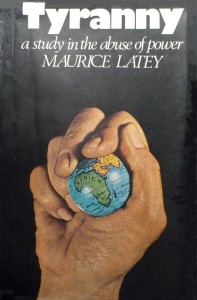Rating: 




Tyranny: A Study in the Abuse of Power by Maurice Latey (1969)
”Revolutions have never lightened the burden of tyranny; they have only shifted it to another shoulder” (George Bernard Shaw, 1903)
This is a very useful 310 page study by political commentator Maurice Latey for those interested in the factors that breed tyranny. He is particularly concerned with the psychological factors, what motivates these men to behave in the way they do. Although of necessity taking a broad historical approach, he concentrates on the twentieth century after World War One, arguably an ‘age of tyranny’, with Lenin, Mussolini, Hitler, Stalin and Mao Tse Tung foremost amongst others.
In ancient Greece, a tyrant was a ruler who seized power unconstitutionally or inherited such power. In the 10th and 9th centuries BC, monarchy had been the usual form of government in the Greek states; the aristocratic regimes that had replaced monarchy were by the 7th century BC themselves unpopular. Thus the opportunity arose for ambitious men to seize power in the name of the oppressed. Tyrants eventually came to be considered oppressive. Latey’s more refined definition of a tyrant is ‘a ruler who exercises arbitrary power beyond the scope permitted by the laws, customs and standards of his time and society, and who does so with a view to maintaining or increasing that power’.
He examines the tyrants of Greece and Rome, and the authors of that era. Aristotle said that tyranny aims at three things- firstly to keep the subjects in humility, secondly to have them distrust each other, and thirdly to render them powerless for opposition. These principle features of a tyrant can be discerned in the many historical examples, but also, underscoring their validity, in the leadership struggles of today, in settings as diverse as party politics, the church, the office and the company boardroom..
The basic dilemma of all tyrants therefore, is how to combine that fragmentation of society that enables the ruler to maintain power, with the proper degree of social organization that enables him to achieve his purposes. The first priority is always to smash the organization of opposition. In the case of a ruler who comes to power after a period of warfare, or social upheaval, this may already have been achieved. Hitler’s rise to power in a defeated and uncertain Germany is a classic case. In hindsight, since it was the Treaty of Versailles that set the reparation terms which in turn led to the sweeping victories of the National Socialists under Hitler, the Allied powers sowed the seeds of further conflict.
Following the ignominious defeat of Germany in World War I, Adolf Hitler soon became leader of the National Socialist German Workers’ Party – the Nazis. After assuming the position as Chancellor of Germany in 1933, Hitler suppressed the political opposition in the country, various minorities, established the Gestapo – the secret state police, a system of concentration camps, and capitalized on latent resentment of the Jews, which later grew into genocide. Hitler wiped out one-third of the Jewish population of Europe.
Like many tyrants of the past, says Dick Geary in Hitler and Nazism, Adolf Hitler was “a master of crowd psychology as well as a brilliant orator”. He believed that ‘’the masses were swayed not by their brains but by their emotions.’’ He played on this human weakness by cleverly exploiting the age-old technique of manipulating people’s prejudices and hatred.
In looking at remedies for tyranny, some interesting ideas are presented in the book. For example, man at all times values self-respect, albeit a blanket phrase with multiple meanings. However, it is true to say self-respect does depend on freedom of choice. Not that freedom is a means to self-respect, but rather in an ideal society, they are identical. Hence this topic touches fundamental judgements about man. For example, when the Roman tyrant Caligula used his unlimited freedoms to gratify every whim, at the cost of much death, pain and suffering of those under him, we call him evil, a monster, unfit to rule, deserving of punishment, deserving of death.
So often we minimize the role of those behind the rise to power of the tyrant, sometimes well-meaning perhaps, but blind to what their ideas would produce. We know, however, human nature as it always has been, the rulers of this world will pick up the philosophy of this world if it consolidates their power. In turn, the philosophers will tell them what they want to hear, and consolidate their own power, or prestige. This ultimately is what conflicts with truth, freedom, and personal happiness.